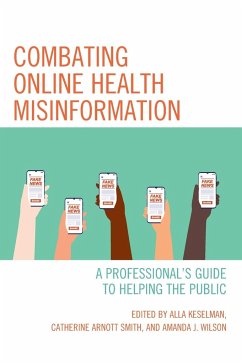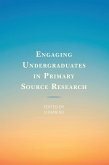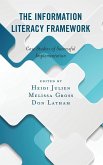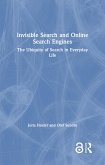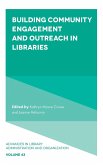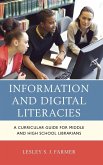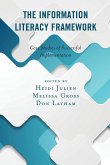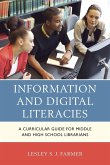Combating Online Health Misinformation
A Professional's Guide to Helping the Public
Herausgeber: Keselman, Alla; Wilson, Amanda J.; Smith, Catherine Arnott
Combating Online Health Misinformation
A Professional's Guide to Helping the Public
Herausgeber: Keselman, Alla; Wilson, Amanda J.; Smith, Catherine Arnott
- Gebundenes Buch
- Merkliste
- Auf die Merkliste
- Bewerten Bewerten
- Teilen
- Produkt teilen
- Produkterinnerung
- Produkterinnerung
The book, written from the e-Health literacy perspective, is unique in its nuanced approach to misinformation. It draws on psychology and information science to explain human susceptibility to misinformation and discusses ways to engage with the public deeply and meaningfully, fostering trust and raising health and information literacy.
Andere Kunden interessierten sich auch für
![Engaging Undergraduates in Primary Source Research Engaging Undergraduates in Primary Source Research]() Engaging Undergraduates in Primary Source Research95,99 €
Engaging Undergraduates in Primary Source Research95,99 €![Information Literacy Framework Information Literacy Framework]() Information Literacy Framework121,99 €
Information Literacy Framework121,99 €![Invisible Search and Online Search Engines Invisible Search and Online Search Engines]() Jutta HaiderInvisible Search and Online Search Engines167,99 €
Jutta HaiderInvisible Search and Online Search Engines167,99 €![Building Community Engagement and Outreach in Libraries Building Community Engagement and Outreach in Libraries]() Kathryn Moore CroweBuilding Community Engagement and Outreach in Libraries114,99 €
Kathryn Moore CroweBuilding Community Engagement and Outreach in Libraries114,99 €![Information and Digital Literacies Information and Digital Literacies]() Lesley S. J. FarmerInformation and Digital Literacies86,99 €
Lesley S. J. FarmerInformation and Digital Literacies86,99 €![Information Literacy Framework Information Literacy Framework]() Information Literacy Framework57,99 €
Information Literacy Framework57,99 €![Information and Digital Literacies Information and Digital Literacies]() Lesley S. J. FarmerInformation and Digital Literacies50,99 €
Lesley S. J. FarmerInformation and Digital Literacies50,99 €-
-
-
The book, written from the e-Health literacy perspective, is unique in its nuanced approach to misinformation. It draws on psychology and information science to explain human susceptibility to misinformation and discusses ways to engage with the public deeply and meaningfully, fostering trust and raising health and information literacy.
Produktdetails
- Produktdetails
- Verlag: Rowman & Littlefield Publishers
- Seitenzahl: 248
- Erscheinungstermin: 30. September 2022
- Englisch
- Abmessung: 260mm x 183mm x 18mm
- Gewicht: 669g
- ISBN-13: 9781538162194
- ISBN-10: 1538162199
- Artikelnr.: 63627145
- Herstellerkennzeichnung
- Libri GmbH
- Europaallee 1
- 36244 Bad Hersfeld
- gpsr@libri.de
- Verlag: Rowman & Littlefield Publishers
- Seitenzahl: 248
- Erscheinungstermin: 30. September 2022
- Englisch
- Abmessung: 260mm x 183mm x 18mm
- Gewicht: 669g
- ISBN-13: 9781538162194
- ISBN-10: 1538162199
- Artikelnr.: 63627145
- Herstellerkennzeichnung
- Libri GmbH
- Europaallee 1
- 36244 Bad Hersfeld
- gpsr@libri.de
Catherine Arnott Smith, PhD, is Professor in the Information School and a Discovery Fellow, Virtual Environments Group, Wisconsin Institutes for Discovery, University of Wisconsin-Madison. She is a former medical librarian who moved into biomedical informatics for her PhD through the Center (now Department) of Biomedical Informatics at the University of Pittsburgh (2002), where she was a National Library of Medicine medical informatics predoctoral trainee. Her research centers on consumer interactions with clinical information systems, mediated through text, in settings that range from patient portals to public libraries to disabilities support centers. Alla Keselman, PhD, is a Senior Social Science Analyst in the Office of Engagement and Training, National Library of Medicine, Bethesda, MD. She holds a PhD in human cognition and learning and an MA in biomedical informatics from Columbia University. Dr. Keselman coordinates NLM efforts in evaluating the impact of its health information outreach and community engagement programs. Her research interests include lay understanding of complex health concepts, scientific literacy, and the provision of health information outside clinical settings. She has done work on bringing health and environment-related topics to the science classroom and conducted research into the role of libraries in providing health information to the public. Jointly, Dr. Catherine Arnott Smith and Dr. Alla Keselman co-edited "Meeting Health Information Needs Outside Of Healthcare: Opportunities and Challenges" (2015, Elsevier) and co-wrote "Consumer Health Informatics: Enabling Digital Health for Everyone" (in press Dec 2020, Chapman & Hall). Amanda J. Wilson, MLS, is Chief, Office of Engagement and Training (OET) at the National Library of Medicine. She holds a MS in Library Science from the University of North Carolina at Chapel Hill and a BA in music and psychology from Emory University. OET brings together the general engagement, training, and other outreach staff from across the library whose primary focus has been on the Library's presence across the U.S. and internationally, and coordinates the National Network of Libraries of Medicine (NNLM), the field force for the National Library of Medicine. Wilson is also an adjunct professor at The Catholic University of America Department of Library and Information Science.
Preface
Part I: The Ecology of Online Health Information
Chapter 1. Defining Health Misinformation.
Chapter 2. The Ecology of Online Health Information and COVID-19
Misinformation.
Chapter 3. The Health Misinformation Ecosystem on Social Media: Emerging
Evidence and Research Gaps.
Chapter 4. Flies in the Ointment: Vaccine-hesitancy and Bad Medical Advice
During the Russian COVID-19 Pandemic.
Part II: Susceptibility to Misinformation; Literacies as Safeguards
Chapter 5. Let the Reader and Viewer Beware: Quality Markers for Health
Information.
Chapter 6. Preventing Health Number Confusion Through Clear Communication
Design.
Chapter 7. The Case of Everyday Science: Science Literacy and Resilience
Against Health Misinformation.
Chapter 8. An Examination of the Multiple Dimensions of Public Trust in
Science as Health Misinformation Roadblocks.
Chapter 9. Critical Cultural Literacy Education as a Bridge to Improving
Health Disparities in BIPOC Communities.
Part III: Practice
Chapter 10. When Medical Practice Meets Medical Myth: Confronting
Misinformation in the Clinical Encounter.
Chapter 11. Teaching Young People to Think Critically about Health Claims
and Choices.
Chapter 12. Medical Professionals Using Social Media to Combat
Misinformation.
Chapter 13. Participation, Empowerment, and Equity: Addressing eHealth
Misinformation with Community Engagement in Libraries.
Chapter 14. Addressing Health Misinformation in the Infodemic Era: The
Alaska Public Health Information Response Team.
About the Editors
About the Contributors
Part I: The Ecology of Online Health Information
Chapter 1. Defining Health Misinformation.
Chapter 2. The Ecology of Online Health Information and COVID-19
Misinformation.
Chapter 3. The Health Misinformation Ecosystem on Social Media: Emerging
Evidence and Research Gaps.
Chapter 4. Flies in the Ointment: Vaccine-hesitancy and Bad Medical Advice
During the Russian COVID-19 Pandemic.
Part II: Susceptibility to Misinformation; Literacies as Safeguards
Chapter 5. Let the Reader and Viewer Beware: Quality Markers for Health
Information.
Chapter 6. Preventing Health Number Confusion Through Clear Communication
Design.
Chapter 7. The Case of Everyday Science: Science Literacy and Resilience
Against Health Misinformation.
Chapter 8. An Examination of the Multiple Dimensions of Public Trust in
Science as Health Misinformation Roadblocks.
Chapter 9. Critical Cultural Literacy Education as a Bridge to Improving
Health Disparities in BIPOC Communities.
Part III: Practice
Chapter 10. When Medical Practice Meets Medical Myth: Confronting
Misinformation in the Clinical Encounter.
Chapter 11. Teaching Young People to Think Critically about Health Claims
and Choices.
Chapter 12. Medical Professionals Using Social Media to Combat
Misinformation.
Chapter 13. Participation, Empowerment, and Equity: Addressing eHealth
Misinformation with Community Engagement in Libraries.
Chapter 14. Addressing Health Misinformation in the Infodemic Era: The
Alaska Public Health Information Response Team.
About the Editors
About the Contributors
Preface
Part I: The Ecology of Online Health Information
Chapter 1. Defining Health Misinformation.
Chapter 2. The Ecology of Online Health Information and COVID-19
Misinformation.
Chapter 3. The Health Misinformation Ecosystem on Social Media: Emerging
Evidence and Research Gaps.
Chapter 4. Flies in the Ointment: Vaccine-hesitancy and Bad Medical Advice
During the Russian COVID-19 Pandemic.
Part II: Susceptibility to Misinformation; Literacies as Safeguards
Chapter 5. Let the Reader and Viewer Beware: Quality Markers for Health
Information.
Chapter 6. Preventing Health Number Confusion Through Clear Communication
Design.
Chapter 7. The Case of Everyday Science: Science Literacy and Resilience
Against Health Misinformation.
Chapter 8. An Examination of the Multiple Dimensions of Public Trust in
Science as Health Misinformation Roadblocks.
Chapter 9. Critical Cultural Literacy Education as a Bridge to Improving
Health Disparities in BIPOC Communities.
Part III: Practice
Chapter 10. When Medical Practice Meets Medical Myth: Confronting
Misinformation in the Clinical Encounter.
Chapter 11. Teaching Young People to Think Critically about Health Claims
and Choices.
Chapter 12. Medical Professionals Using Social Media to Combat
Misinformation.
Chapter 13. Participation, Empowerment, and Equity: Addressing eHealth
Misinformation with Community Engagement in Libraries.
Chapter 14. Addressing Health Misinformation in the Infodemic Era: The
Alaska Public Health Information Response Team.
About the Editors
About the Contributors
Part I: The Ecology of Online Health Information
Chapter 1. Defining Health Misinformation.
Chapter 2. The Ecology of Online Health Information and COVID-19
Misinformation.
Chapter 3. The Health Misinformation Ecosystem on Social Media: Emerging
Evidence and Research Gaps.
Chapter 4. Flies in the Ointment: Vaccine-hesitancy and Bad Medical Advice
During the Russian COVID-19 Pandemic.
Part II: Susceptibility to Misinformation; Literacies as Safeguards
Chapter 5. Let the Reader and Viewer Beware: Quality Markers for Health
Information.
Chapter 6. Preventing Health Number Confusion Through Clear Communication
Design.
Chapter 7. The Case of Everyday Science: Science Literacy and Resilience
Against Health Misinformation.
Chapter 8. An Examination of the Multiple Dimensions of Public Trust in
Science as Health Misinformation Roadblocks.
Chapter 9. Critical Cultural Literacy Education as a Bridge to Improving
Health Disparities in BIPOC Communities.
Part III: Practice
Chapter 10. When Medical Practice Meets Medical Myth: Confronting
Misinformation in the Clinical Encounter.
Chapter 11. Teaching Young People to Think Critically about Health Claims
and Choices.
Chapter 12. Medical Professionals Using Social Media to Combat
Misinformation.
Chapter 13. Participation, Empowerment, and Equity: Addressing eHealth
Misinformation with Community Engagement in Libraries.
Chapter 14. Addressing Health Misinformation in the Infodemic Era: The
Alaska Public Health Information Response Team.
About the Editors
About the Contributors

